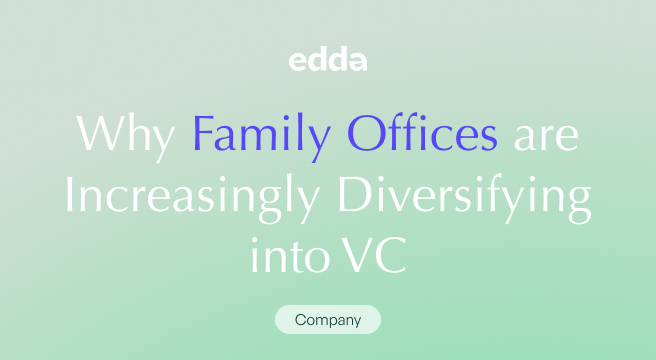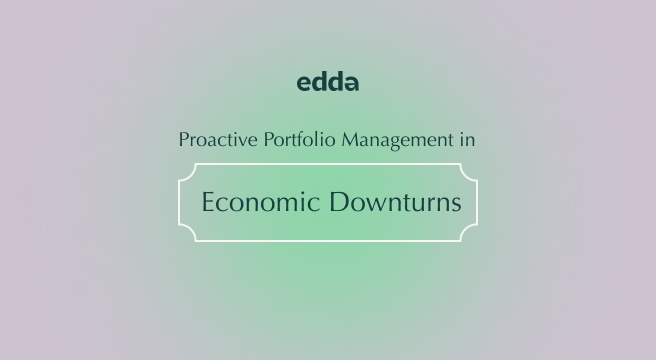Family offices, the guardians of generational wealth, are increasingly pivoting towards venture capital (VC) as a key component of their investment portfolios. This trend is a strategic evolution from traditional wealth preservation tactics to a more dynamic approach that embraces the high-risk, high-reward nature of venture investments.
In this article, we’ll explore the reasons behind this shift, illuminating how family offices are leveraging VC not only to enhance financial returns but also to align investments with forward-thinking innovation and impactful societal contributions. Furthermore, discover how venture capital tech like Edda’s CRM portfolio management software can help family businesses looking to pivot into the world of VC.
The Allure of Venture Capital for Family Offices
In the investment sphere, family offices have traditionally gravitated towards assets that promise stability and reliable growth, such as bonds, real estate, and blue-chip stocks.
However, the changing world of global finance has nudged these entities to reconsider their investment strategies, leading to an increased interest in venture capital. This shift is not only a trend but seems to be a strategic realignment towards harnessing the high-return potential and innovative thrust that VC investments offer.
High Return Potential
The primary draw of venture capital for family offices lies in its ability to deliver outsized returns. Unlike the incremental gains typically associated with traditional investments, VC can offer exponential growth.
This is particularly true for startups that disrupt industries or introduce groundbreaking technologies, which, upon reaching maturity through public offerings or acquisitions, can significantly amplify a portfolio’s value. The allure of backing the next unicorn—startups valued at over a billion dollars—has become an enticing prospect for family offices seeking to enhance their financial legacy.
Market Performance Comparison
Recent years have seen a noticeable dip in the returns from traditional asset classes. Bonds and public equities, once the bedrock of stable investment portfolios, have faced challenges due to economic uncertainties, low interest rates, and market saturation.
In contrast, the VC sector has demonstrated resilience and growth, buoyed by the relentless pace of technological innovation and digital transformation. This divergence has underscored VC’s comparative advantage, making it an increasingly attractive component of diversified investment portfolios
Access to Innovation and Sectoral Growth
Venture capital investments stand at the frontier of innovation, offering family offices a gateway to participate in shaping future industries. By investing in startups, family offices gain early access to disruptive technologies and novel business models, positioning them as integral players in the innovation ecosystem. This access is not just about financial returns but also about being part of the narrative that drives technological advancement and industry evolution.
Transformative Trends
The strategic infusion of VC into family office portfolios allows for active participation in transformative trends across critical sectors such as technology, healthcare, and clean energy. This involvement goes beyond investment; it’s about contributing to the development of solutions that address global challenges, from climate change to healthcare accessibility. By aligning their investments with sectoral growth and innovation, family offices can drive positive change while pursuing substantial financial returns.
Strategic Advantages of VC Investment for Family Offices
This pivot also aligns with the broader investment philosophy and objectives unique to family offices, including the pursuit of diversification, long-term value creation, and meaningful engagement with their investments.
Diversification Benefits
The addition of venture capital to a family office’s investment portfolio introduces a critical layer of diversification, essential for effective risk management. Unlike traditional asset classes such as stocks and bonds, which can be susceptible to market cycles and economic fluctuations, VC investments often operate independently of these broader market movements. This characteristic of VC can provide a buffer against volatility in other parts of the portfolio, contributing to more stable overall performance.
VC opens avenues to emerging sectors and markets that are at the forefront of innovation, such as fintech, biotech, and renewable energy. This exposure broadens the investment landscape for family offices and also positions them to capitalize on new growth areas that could define the economic landscape of the future.
Long-term Investment Horizon
Family offices are inherently geared towards preserving and growing wealth across generations, which often translates into a long-term investment outlook. This perspective aligns seamlessly with venture capital, where investments typically take several years to mature.
The ability to commit capital for extended periods allows family offices to support startups through various growth phases, from early-stage development to market expansion and eventual exit, without the pressure for short-term liquidity that institutional investors might face.
This patient capital approach is particularly suited to the VC ecosystem, where time is often a critical ingredient for innovation and scaling. It allows family offices to be more strategic in their investment choices, focusing on potential value creation over the long term rather than immediate returns.
Direct Impact & Engagement
Beyond financial considerations, family offices frequently seek investments that offer opportunities for direct impact and engagement. Venture capital investments are conducive to this hands-on approach, allowing family offices to contribute more than just capital. Through board participation or advisory roles, family offices can provide strategic guidance, industry expertise, and valuable networks to help startups navigate growth challenges.
This level of involvement enhances the potential success of the investment while allowing family offices to closely align their investments with their values and interests. Whether it’s supporting sustainable energy initiatives, advancing healthcare innovations, or fostering educational technologies, VC investments enable family offices to actively participate in shaping the ventures they back.
Navigating Challenges in VC Investing
While gravitating towards VC presents numerous opportunities for family offices, challenges can also arise. These challenges range from the inherent risks associated with early-stage investing to the complexities of integrating venture capital within a diversified investment portfolio. Many of these challenges can be mitigated with the help of venture capital management software.
Due Diligence & Risk Assessment
One of the primary challenges family offices face in VC investing is conducting thorough due diligence on potential investments. Early-stage companies often lack a long track record or financial history, making it difficult to assess their viability and potential for success. This requires a deep dive into the startup’s business model, market opportunity, competitive landscape, and, critically, the strength and vision of the founding team.
Moreover, the high-risk nature of venture capital, where a significant portion of startups may fail to deliver expected returns, adds an additional layer of complexity to the investment decision-making process. Family offices must develop a robust framework for risk assessment that can effectively identify high-potential opportunities while mitigating the likelihood of significant losses.
Illiquidity & Long-Term Commitment
Venture capital investments are inherently illiquid, often requiring a multi-year commitment before any returns can be realized. This illiquidity can be a significant challenge for family offices, particularly if the need arises to reallocate assets or access liquidity for other purposes. Balancing the long-term, locked-in nature of VC investments with the overall liquidity needs of the family office is a critical aspect of portfolio management that requires strategic planning and foresight.
Access to Quality Deals
As more investors, including institutional funds, high-net-worth individuals, and other family offices, enter the VC space, competition for high-quality deals has intensified. Gaining access to promising startups and ensuring a place in competitive funding rounds can be challenging, especially for family offices without established track records or networks in the venture capital ecosystem.
Building relationships with VC firms, angel investor networks, and incubators can be crucial for family offices looking to enhance their deal flow. Additionally, developing a reputation as a value-adding investor, beyond just providing capital, can help in securing opportunities to invest in sought-after startups.
Integration with Investment Portfolio
Incorporating venture capital investments into a broader investment portfolio presents another layer of complexity. Family offices must consider how VC allocations fit within their overall risk tolerance, investment strategy, and asset allocation model. This includes assessing the impact of VC investments on portfolio diversification, risk profile, and return expectations.
The performance measurement of VC investments, which can be nuanced and non-linear, requires a custom approach. Traditional metrics and benchmarks used for other asset classes may not adequately capture the value and performance of venture capital investments, and so the development of specialized reporting and analysis tools is necessary.
Integrating Edda’s Software into Family Office VC Strategies
Edda’s venture capital technology offers a comprehensive solution for family offices venturing into the VC space, addressing key challenges from due diligence to portfolio management.
Efficient Due Diligence & Risk Assessment
Edda streamlines the due diligence process, enabling family offices to thoroughly evaluate startup potentials and risks with advanced data analysis tools. This supports more informed investment decisions by providing deep insights into the financial health and market positions of potential investments.
Dynamic Portfolio Management
With Edda’s venture capital portfolio management software, family offices can effectively track company performance in real-time against key metrics. This facilitates timely decisions on follow-on investments or exits, ensuring portfolio strategies remain aligned with overall investment goals.
Enhanced Communication and Reporting
Edda fosters seamless collaboration within family offices and with external advisors, centralizing communication and decision-making. Customizable reporting features offer clear insights into portfolio performance and market trends, crucial for strategy reviews and stakeholder updates.
Holistic Investment Strategy Integration
Designed to complement a family office’s broader investment framework, Edda ensures VC activities are synergized with wider asset allocations and risk profiles, maintaining strategic coherence across the investment portfolio.
Ready to elevate your family office’s venture capital endeavors with enhanced strategic oversight and operational efficiency? Explore how Edda’s venture capital CRM can transform your investment journey from initial evaluation to ongoing management. Why wait? Schedule a demo today.


